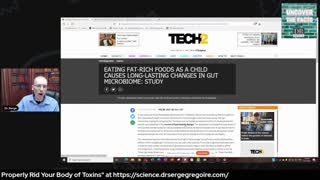Premium Only Content

Nutrition Science Vs the Trends
https://linktr.ee/diabetescares21
In today's program, we are going to share the science behind the keto diet and address the nuances and considerations as to whether or not this is the right plan for you.
Before we get into what the keto diet islets make sure we understand the background of ketosis and how our body uses energy.
A metabolism is a group of chemical reactions that take place within the body’s cells for the use of energy.
It is essentially the body’s process of converting food into energy to be utilized in our muscles, nerves, cells, breathing, digestion and circulation of the blood.
Our bodies typically use glucose as energy, which comes from carbohydrate. This comes from things like fruits, veggies and grains.
The body either uses the glucose (simple sugar), or glycogen, the stored form of glucose in the liver as our main source of energy. Glucose travels into the cells by way of insulin the bodies storage hormone, so it can be used for energy production there.
When we decrease the amount of carbohydrate in our diet our insulin levels reduce and the amount of available energy via glucose is also reduced.
So the body needs to turn to a different source of energy, triggering an increased delivery of fatty acids to be used through the liver for fuel.
These fatty acids are called triglycerides which are trapped within your fat cells, until called upon for energy.
This is why nutritional plans like the adkins diet have become so popular for weight loss as they trigger the body's use of fat for energy.
Some of those fatty acids get turned into ketones, or organic acid compounds. Ketosis is the metabolic state where the bodies glucose levels become so low that it switches over to fat stores releasing ketones.
A Ketogenic diet is essentially a metabolic switch from using glucose as the body’s main energy source to burning body fat and ketones.
It is a high fat, moderate protein, low carbohydrate food plan which consists of: 60-75% fat, 15-30% protein, 5-10% carbohydrates.
As the body adapts or becomes more comfortable using fat and ketones we become more efficient at employing these fuel sources for our energy needs.
Basically we become more efficient at oxidizing fat. This has its advantages from a metabolic standpoint.
Some of the advantages include a reduction in inflammatory markers associated with metabolic disease.
Some of the basic biomarkers include lowered triglycerides and LDL levels, a decrease in insulin resistance resulting in improved blood sugar regulation, and upregulation in hormone sensitivity reducing stress on the body.
https://linktr.ee/healthfitness21
-
 10:10
10:10
The Nutrition Scientist
4 years agoThe latest science on children's nutrition
11 -
 0:09
0:09
Mysturygurl
3 years agoFloating ball Science
23 -
 3:22
3:22
WXYZ
3 years agoMichigan Science Center
101 -
 3:14
3:14
WXYZ
3 years agoMichigan Science Center
33 -
 1:41
1:41
STLNutritionDoc
4 years agoNutrition Foundation
128 -
 4:51:08
4:51:08
Wahzdee
18 hours agoSniper Elite Then Extraction Games—No Rage Challenge! 🎮🔥 - Tuesday Solos
127K6 -
 2:12:58
2:12:58
Robert Gouveia
17 hours agoSenator's Wife EXPOSED! Special Counsel ATTACKS; AP News BLOWN OUT
132K81 -
 55:07
55:07
LFA TV
1 day agoDefending the Indefensible | TRUMPET DAILY 2.25.25 7PM
75.8K22 -
 6:09:26
6:09:26
Barry Cunningham
1 day agoTRUMP DAILY BRIEFING - WATCH WHITE HOUSE PRESS CONFERENCE LIVE! EXECUTIVE ORDERS AND MORE!
239K80 -
 1:46:37
1:46:37
Game On!
18 hours ago $7.84 earnedPUMP THE BRAKES! Checking Today's Sports Betting Lines!
126K4